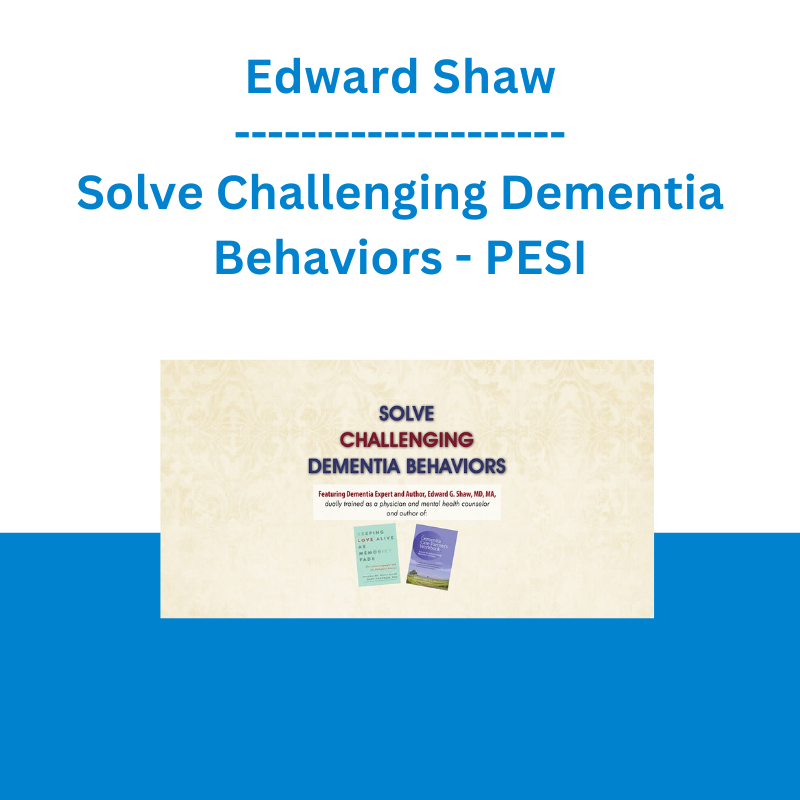*** Proof of Product ***
Exploring the Essential Features of “Edward Shaw – Solve Challenging Dementia Behaviors: Support Family Connections and Losses as Root Causes – PESI”
Solve Challenging Dementia Behaviors: Support Family Connections and Losses as Root Causes
Speaker: Edward G. Shaw, MD, MA
Duration: 6 Hours 12 Minutes
Format: Audio and Video
Description
If you are a healthcare professional who works with people living with dementia, you’ve probably thought to yourself…I just can’t understand what’s going on in their brain. Through this innovative recording, you will gain new skills to transform the way you approach dementia-related behaviors:
- Manage unmet emotional, relational, and behavioral challenges in people living with dementia
- Realize new solutions for challenging behaviors, using knowledge of attachment theory, attachment loss, and separation distress as a root cause
- Gain strategies for embodied, sensory-based mindfulness to use with people living with dementia
- Facilitate desired emotional love connections and bonds between those with dementia and their caregivers
- Frustration-ending alternatives to manage agitation, aggression, and other challenging behaviors in dementia – without the use of antipsychotic and other drugs
Join dementia expert Edward G. Shaw, MD, MA, nationally known physician, counselor, author, and speaker, for a dynamic recording filled with insightful discussions, interactive learning, and application of practical techniques. You will finish this program feeling confident that you can identify the root cause of challenging behaviors and implement solutions to facilitate emotional connections.
Speaker
Edward G. Shaw, MD, MA
Empath Education, LLC
Edward G. Shaw, MD, MA is dually trained as a physician and mental health counselor. He was the primary care partner for his late wife, Rebecca, who was diagnosed with early-onset Alzheimer’s disease in 2007 at age 53 and died in 2016 after a 9-year journey. Ed was a practicing academic radiation oncologist for 23 years, specializing in the treatment of adults and children with brain cancer. In 2010, inspired by Rebecca’s journey, his medical interest shifted to dementia diagnosis and treatment, and with his addition training in mental health counseling, he founded the Memory Counseling Program in 2011, part of the Section on Gerontology and Geriatric Medicine and the Sticht Center on Healthy Aging and Alzheimer’s Prevention at Atrium Health Wake Forest Baptist in Winston-Salem, North Carolina. The program serves individuals, couples, and families affected by Alzheimer’s disease or another type of dementia.
He is the author of four books. Along with coauthors Deborah Barr and Dr. Gary Chapman, he wrote Keeping Love Alive as Memories Fade: The 5 Love Languages and the Alzheimer’s Journey, which describes his moving personal story of care for Rebecca coupled with an innovative use of the 5 love languages in dementia counseling. He also wrote The Dementia Care Partner’s Workbook, a support group manual and self-study guide for dementia care partners, providing understanding, education, and hope for the long journey of dementia caregiving from diagnosis through end-of-life. He has also co-authored two resources for support group leaders, A Leader’s Manual for Dementia Care Partner Support Groups and A Support Group for People Living with Dementia: The Leaders Manual.
Speaker Disclosures:
Financial: Edward Shaw receives a speaking honorarium and recording royalties from PESI, Inc. He has no relevant financial relationships with ineligible organizations.
Non-financial: Edward Shaw has no relevant non-financial relationships.
Objectives
- Differentiate Alzheimer’s disease and other forms of dementia using a strengths-based, functional abilities model.
- Demonstrate mindfulness interventions and techniques to use for people living with dementia.
- Analyze attachment theory as it relates to people living with dementia, including attachment loss, separation distress, and challenging behaviors.
- Evaluate the 5 Love Language framework as a “toolkit” to build the emotional love connection with those affected by Alzheimer’s and other dementias.
- Choose non-medication-based strategies to manage challenging behavioral expressions in people living with dementia.
- Determine new frustration-ending alternatives to manage agitation, aggression, and other challenging behaviors.
Outline
When the Medical Model Doesn’t Work
- The medical model reimagined focusing on abilities, strengths, and resilience rather than disabilities, weaknesses, and neuropsychiatric symptoms
- 5 cognitive functions (attention/concentration, memory, executive function, language, visuospatial function)
- Personality
- Mood
- Orientation
- Alzheimer’s disease and other forms of dementia
- Transform how you think about and problem-solve common challenges in Alzheimer’s disease and the other dementia types
Mindfulness & Dementia
- Mindfulness reimagined in the setting of dementia
- How mindfulness affects the autonomic nervous system
- Associative vs. dissociative experiences through the lens of mindfulness
- Embodied, sensory-based mindfulness strategies to use with people living with dementia
Attachment Theory & Dementia
- Attachment theory reimagined in the setting of older adults
- Dementia as the ultimate attachment loss
- Separation distress responses in the person with dementia
- The seeking response: Agitation, aggression, “going home,” wandering, resisting care
- The withdrawing response: Depression, apathy, anhedonia
- Affirm, acknowledge, redirect: A simple, powerful attachment-based approach for challenging behavioral expressions of dementia
Strengthening Relationships: The 5 Love Languages and Dementia
- Love reimagined in the context of dementia
- 5 Love Languages in practice – physical touch, quality time, words of affirmation, acts of service, and gifts
- Dementia as an erosion of the “emotional glue” that bonds people together
- Skills to foster emotional love connections and attachment bonds
Target Audience
- This seminar benefits multidisciplinary professionals who care for persons living with dementia and their family care partners. This includes:
- Nurses
- Nurse Practitioners
- Social Workers
- Licensed Professional Counselors
- Psychologists
- Psychiatrists
- Physical Therapists
- Occupational Therapists
- Speech-Language Therapists
- Recreational Therapists
- Nursing Home/Senior Living Administrators
- Activity Directors
- Physician Assistants
- Certified Nursing Assistants
- Anyone desiring next-level skills to proactively assess and intervene as challenging behaviors present
Reviews
Ann H
“great course!”
Please see the full list of alternative group-buy courses available here: https://lunacourse.com/shop/









